

Top Skills and Values Employers Seek from Job-Seekers. Printer-Friendly Version by Randall S.
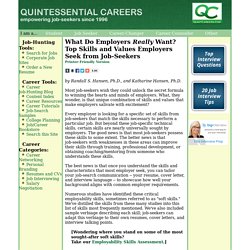
Hansen, Ph.D., and Katharine Hansen, Ph.D. Most job-seekers wish they could unlock the secret formula to winning the hearts and minds of employers. What, they wonder, is that unique combination of skills and values that make employers salivate with excitement? Employability Skills: Skills You Need for a Job. For many people today, a career for life is no longer an option.
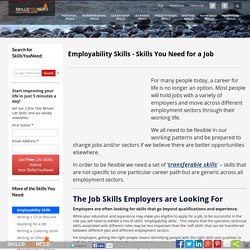
Most people will hold jobs with a variety of employers and move across different employment sectors through their working life. We all need to be flexible in our working patterns and be prepared to change jobs and/or sectors if we believe there are better opportunities elsewhere. In order to be flexible we need a set of 'transferable skills' – skills that are not specific to one particular career path but are generic across all employment sectors. The Job Skills Employers are Looking For Employers are often looking for skills that go beyond qualifications and experience.
While your education and experience may make you eligible to apply for a job, to be successful in the role you will need to exhibit a mix of skills: ‘employability skills’. The top 10 skills that'll get you a job when you graduate. Graduate employers place a lot of emphasis on finding candidates with the right skills and competencies for their organisations.

Depending on the career sector and profession you choose to work in, there could be very specific skills, abilities and knowledge needed to do the job. However, complementing these are general competencies and behaviours that are essential for successful working. These are the key employability skills – the core skills that will make you effective at work, whatever job you do. They are sometimes known as transferable skills because you develop them over time and take them with you as your career develops; think of them as your passport to career success. You'll need to draw on your work experience to give evidence of these skills.
The top ten skills graduate recruiters want 1. This is about knowing how a business or industry works and what makes a company tick. Read more about how to show your commercial awareness 2. Top ten employability skills. Based on a number of surveys on the skills required by graduates undertaken by Microsoft, Target Jobs, the BBC, Prospects, NACE and AGR and other organisations, here is our summary of the skills which were most often deemed important.
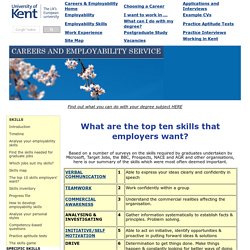
The most important skills to develop in employees to drive company growth over the next five years were (according to the Flux Report by Right Management): 2015 hs questionnaire. 2013questions. WANTS and NEEDS of Young People - Striking a balance. NOTE: This article has changed the way that youth workers are planning their projects.

What makes a young person vulnerable? As a youth worker, some of the young people you will come into contact with may be more vulnerable than others and have a wide range of needs, some more serious than others. These needs could stem from a number of risk factors or negative influences in that young persons life. This could include one or more of the following; Life-Support-Report.pdf. ERASMUS+ KEY ACTION 1: YOUTH MOBILITY – TRAINING COURSE “TURNING YOUNG PEOPLE'S NEEDS INTO AN ACTION PLAN FOR INCLUSIVE COMMUNITY GROWTH” Title: TURNING YOUNG PEOPLE'S NEEDS INTO AN ACTION PLAN FOR INCLUSIVE COMMUNITY GROWTH Dates: 17-23 September 2015 Venue: Caltanissetta, Italy “Turning young people's needs into an action plan for inclusive community growth” is a 7 days training course involving 33 youth workers and 11 youth organizations from EU and Western Balkans countries (Italy, Bosnia and Herzegovina, Estonia, Kosovo, The Netherlands, Lithuania, Macedonia, Montenegro, Poland, Romania, Serbia).
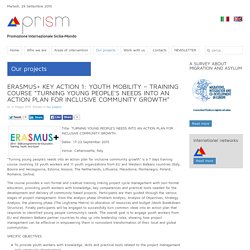
The course provides a non-formal and creative training linking project cycle management with non-formal education, providing youth workers with knowledge, key competences and practical tools needed for the development and delivery of community-based projects. Participants are then guided through the various stages of project management: from the analysis phase (Problem Analysis, Analysis of Objectives, Strategy Analysis, the planning phase (The Logframe Matrix) to allocation of resources and budget (Work Breakdown Structure).
Hackney Council - Child Poverty Needs Assessment. In 2011 the Council conducted a children and young people's needs assessment which contained a chapter about the material aspects of child poverty and provided a thorough, wide ranging analysis of children and young people's needs, mapped against existing services.
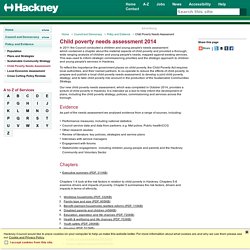
This was used to inform strategic commissioning priorities and the strategic approach to children and young people's services in Hackney. To reflect the importance the government places on child poverty, the Child Poverty Act requires local authorities, and their named partners, to co-operate to reduce the effects of child poverty; to prepare and publish a local child poverty needs assessment; to develop a joint child poverty strategy; and to take child poverty into account in the production of the Sustainable Communities Strategy. Our new child poverty needs assessment, which was completed in October 2014, provides a picture of child poverty in Hackney.
Evidence Chapters Executive summary (PDF, 311KB) Children and Young People's Needs Analysis 2010. CYPP-Annual-Review-2015. CYPP Appendix 1 Index CYPP 2014-2017. Children and Young People’s Plan (CYPP) 2011-2014. Children and Young People’s Plan (CYPP) 2011-2014 also known as: CYPP, Young People, Young People's Plan.
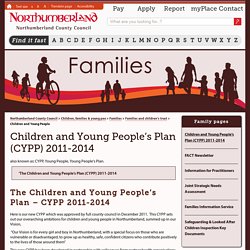
‘The Children and Young People’s Plan (CYPP) 2011-2014 Here is our new CYPP which was approved by full county council in December 2011. This CYPP sets out our overarching ambitions for children and young people in Northumberland, summed up in our Vision, "Our Vision is for every girl and boy in Northumberland, with a special focus on those who are vulnerable or disadvantaged, to grow up as healthy, safe, confident citizens who contribute positively to the lives of those around them” This new CYPP has been developed in partnership with colleagues from partner health organisations and all members of the Families and Children's Trust. Our key priorities that support our vision are: